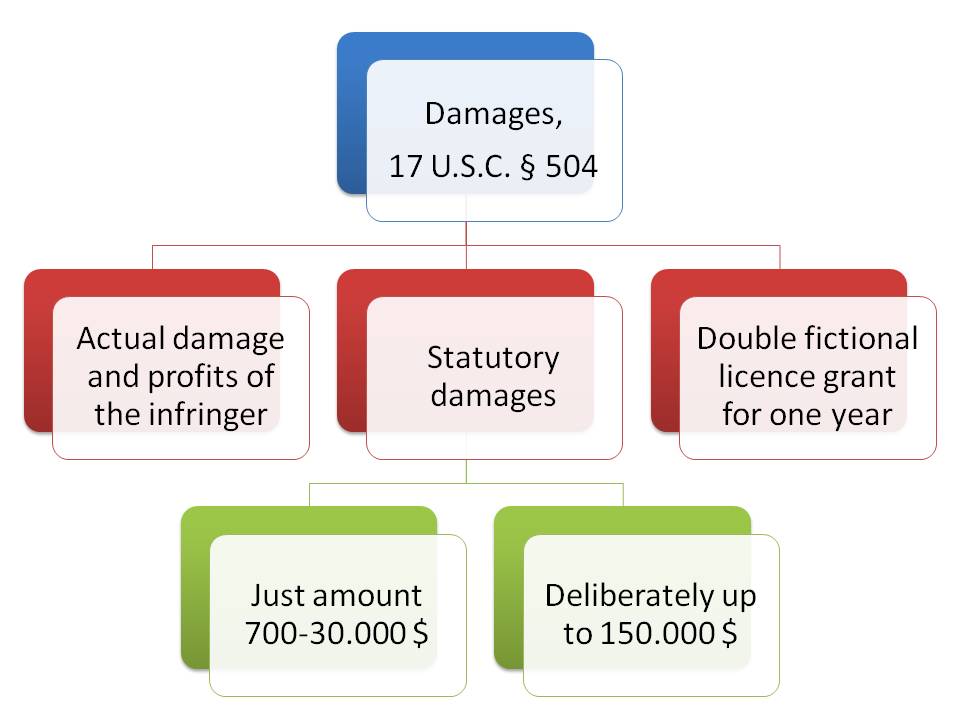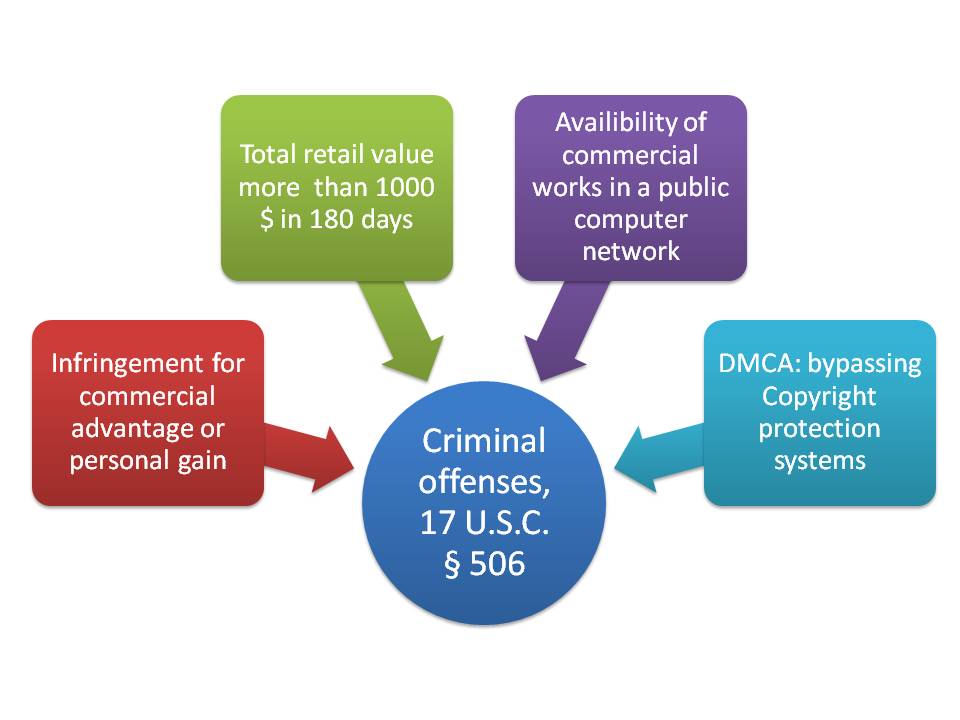Version [31636]
Dies ist eine alte Version von IntUrhRInjunctions erstellt von Jorina Lossau am 2013-06-19 14:50:03.
Internationaler Gewerblicher Rechtsschutz und Urheberrecht II
6.4 - Injunctions and damages
| File | Last modified | Size |
|---|---|---|
| IntUrhRCriminalOffenses.jpg | 2023-10-06 18:36 | 49Kb |
| IntUrhRDamages.jpg | 2023-10-06 18:36 | 55Kb |
| Additionally to the regular US Procedure Law (28 U.S.C. §§ 1651-4001) there are specific rules for copyright actions (17 U.S.C. § 501). The courts have the capacity to order all reasonable and appropriate temporary and final injunctions (einstweilige Verfügungen) to protect the rights of the copyright owner. Civil actions are limited unless the infringement is commenced within three years after the claim accrued (17 U.S.C. § 507 (b)). |
§ 502—Remedies for infringement: Injunctions
(a) Any court having jurisdiction of a civil action arising under this title may, subject to the provisions of section 1498 of title 28 grant temporary and final injunctions on such terms as it may deem reasonable to prevent or restrain infringement of a copyright.
(b) Any such injunction may be served anywhere in the United States on the person enjoined; it shall be operative throughout the United States and shall be enforceable, by proceedings in contempt or otherwise, by any United States court having jurisdiction of that person. The clerk of the court granting the injunction shall, when requested by any other court in which enforcement of the injunction is sought, transmit promptly to the other court a certified copy of all the papers in the case on file in such clerk's office. |
| The possible amount of the Copyright owner’s claims is defined in 17 U.S.C. § 504. The infringer is liable for the actual damages and his (unlawful) profits that belong to the copyright owner. As very often the copyright owner can proof neither his actual loss nor the profits of the infringer although there is eased rule of proof for the infringer’s profits. In these cases the courts can order statutory damages that are based on typical appropriate license fees. |
§ 504—Remedies for infringement: Damages and profits
(a) IN GENERAL.—Except as otherwise provided by this title, an infringer of copyright is liable for either—
(1) the copyright owner's actual damages and any additional profits of the infringer, as provided by subsection (b); or (2) statutory damages, as provided by subsection (c).
(b) ACTUAL DAMAGES AND PROFITS.—The copyright owner is entitled to recover the actual damages suffered by him or her as a result of the infringement, and any profits of the infringer that are attributable to the infringement and are not taken into account in computing the actual damages. In establishing the infringer's profits, the copyright owner is required to present proof only of the infringer's gross revenue, and the infringer is required to prove his or her deductible expenses and the elements of profit attributable to factors other than the copyrighted work.
(c) STATUTORY DAMAGES.—
(1) Except as provided by clause (2) of this subsection, the copyright owner may elect, at any time before final judgment is rendered, to recover, instead of actual damages and profits, an award of statutory damages for all infringements involved in the action, with respect to any one work, for which any one infringer is liable individually, or for which any two or more infringers are
liable jointly and severally, in a sum of not less than $750 or more than $30,000 as the court considers just. For the purposes of this subsection, all the parts of a compilation or derivative work constitute one work.
(2) In a case where the copyright owner sustains the burden of proving, and the court finds, that infringement was committed willfully, the court in its discretion may increase the award of statutory damages to a sum of not more than $150,000. In a case where the infringer sustains the burden of proving, and the court finds, that such infringer was not aware and had no reason to believe that his or her acts constituted an infringement of copyright, the court in its discretion may reduce the award of statutory damages to a sum of not less than $200. The court shall remit statutory damages in any case where an infringer believed and had reasonable grounds for believing that his or her use of the copyrighted work was a fair use under section 107, if the infringer was:
(i) an employee or agent of a nonprofit educational institution, library, or archives acting within the scope of his or her employment who, or such institution, library, or archives itself, which infringed by reproducing the work in copies or phonorecords; or
(ii) a public broadcasting entity which or a person who, as a regular part of the nonprofit activities of a public broadcasting entity (as defined in subsection (g) of section 118) infringed by performing a published nondramatic literary work or by reproducing a transmission program embodying a performance of such a work. (…)
§ 505—Remedies for infringement: Costs and attorney's fees
In any civil action under this title, the court in its discretion may allow the recovery of full costs by or against any party other than the United States or an officer thereof. Except as otherwise provided by this title, the court may also award a reasonable attorney's fee to the prevailing party as part of the costs. |

| Additional: impounding, destruction and disposition of infringing articles (unlawful copies and technical reproduction measures), so far reasonable, 17 U.S.C. § 503 |
| In cases of serious copyright infringements the infringer has not only to expect civil actions but also criminal offenses(17 U.S.C. § 506). In addition, also the bypassing of Copyright protection systems (17 U.S.C. § 1204) and the import of unlawful copies and devises (17 U.S.C. § 603) are criminal offences. Minor offences like fraudulent copyright notice, fraudulent removal of copyright notice and false representation are fined with 2.500 $. |

Diese Seite wurde noch nicht kommentiert.





